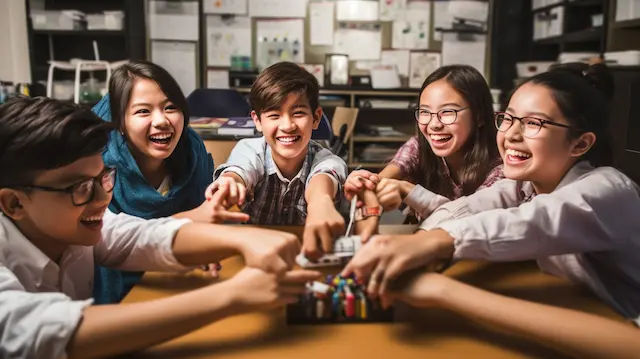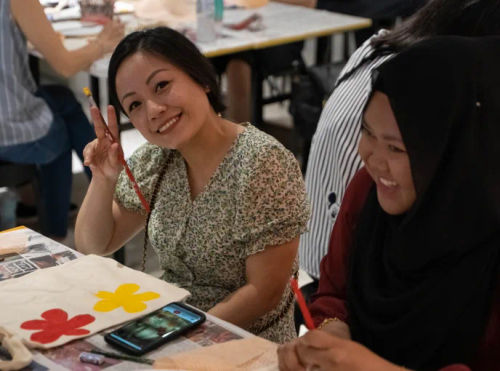Team Building Activities For Students Singapore

Team building activities play a crucial role in nurturing teamwork and collaboration skills among students. In Singapore, a bustling city known for its multicultural environment, there are numerous opportunities for students to engage in enriching team building experiences. These activities not only promote effective communication and problem-solving but also cultivate leadership and interpersonal skills. By participating in team building activities, students can gain practical knowledge and develop the essential skills that will benefit them academically and in their future professional endeavors.
Importance of Team Building for Students
Team building activities offer a myriad of benefits for students. Firstly, they enhance communication skills by encouraging students to express their thoughts, actively listen to others, and effectively convey ideas. Through collaborative problem-solving tasks, students learn to think critically and creatively, finding innovative solutions as a team. Team building activities also foster leadership skills as students take on various roles, delegate responsibilities, and motivate their peers to achieve common goals. Additionally, these activities promote interpersonal skills, helping students build positive relationships, empathy, and respect for diverse perspectives.
Key Consideration Factors for Selecting Team Building Activities
- Age appropriateness: Ensure that the activities are suitable for the students’ developmental stage.
- Group size: Consider the number of participants as it can influence the dynamics and effectiveness of the activities.
- Objectives: Define clear goals and objectives to align the activities with desired outcomes such as communication, problem-solving, or leadership skills.
- Location and resources: Take into account the practicality and feasibility of the activities based on the available facilities and resources.
Benefits and Learning Outcomes
- Teamwork: Cultivate a sense of collaboration, cooperation, and the ability to work effectively as a team.
- Leadership: Develop leadership skills by taking on responsibilities, making decisions, and guiding the team.
- Communication: Enhance listening, articulation of ideas, and giving constructive feedback.
- Problem-solving: Foster analytical thinking, brainstorming solutions, and implementing strategies as a cohesive unit.
- Adaptability: Promote the ability to adjust approaches and navigate unexpected situations.
- Resilience: Develop perseverance and the ability to bounce back from challenges.
Best Team Building Activities For Students Singapore
1. Art Jamming Workshop

Art Jamming Workshop is a creative team building activity where students can explore their artistic side in a relaxed and collaborative environment. Participants engage in a painting session where they can express their creativity using various art materials. This activity encourages teamwork and communication as students collaborate, share ideas, and create a collective art piece. It fosters a sense of camaraderie and allows students to unleash their imagination while building their artistic skills.
2. Cooking Challenge

The Cooking Challenge activity provides an exciting opportunity for students to work together as a team to prepare a delicious meal. Participants are divided into teams and given a set of ingredients and cooking tools. They must collaborate, delegate tasks, and use their culinary skills to create a successful dish within a given timeframe. This activity promotes teamwork, communication, and problem-solving as students work together to overcome challenges and showcase their culinary creativity.
3. Sports Day

Sports Day offers a range of fun and competitive sports activities that promote teamwork, cooperation, and healthy competition among students. Participants engage in various sports such as relay races, tug-of-war, and team-building games. This activity not only encourages physical fitness but also fosters teamwork, communication, and sportsmanship. Sports Day provides an inclusive environment for students to showcase their athletic abilities, build relationships, and develop essential life skills.
4. Music Collaborations

Music Collaborations allow students to come together and create harmonious melodies as a team. Students can form bands or vocal groups and work together to compose songs, rehearse performances, and showcase their musical talents. This activity enhances teamwork, communication, and creativity as students collaborate on musical arrangements, harmonies, and choreography. Music Collaborations provide an avenue for students to express themselves artistically while building strong bonds and appreciating the power of music.
5. Team-based Problem Solving

Team-based Problem Solving activities challenge students to solve complex problems collaboratively. Participants are presented with real-life scenarios or puzzles that require critical thinking, analytical skills, and effective communication to find innovative solutions. This activity promotes teamwork, decision-making, and creativity as students work together to analyze the problems, brainstorm ideas, and implement effective problem-solving strategies. Team-based Problem Solving encourages students to think outside the box, adapt to different perspectives, and develop valuable problem-solving skills.
6. Outdoor Adventure Course

The Outdoor Adventure Course offers students an exhilarating experience where they can engage in various outdoor challenges and obstacles. Participants navigate through high ropes courses, zip lines, and team-building activities that require cooperation, trust, and communication. This activity promotes teamwork, leadership, and resilience as students work together to overcome physical and mental challenges in a thrilling outdoor setting. The Outdoor Adventure Course builds confidence, fosters personal growth, and encourages students to step out of their comfort zones.
7. Escape Room Experience

The Escape Room Experience is a captivating team building activity where students are immersed in a challenging and immersive scenario. Participants must work together, solving puzzles and riddles within a set timeframe to “escape” the room. This activity promotes teamwork, communication, and problem-solving as students collaborate, share information, and think critically to unravel the mysteries. The Escape Room Experience encourages students to think strategically, adapt to different challenges, and effectively communicate to achieve a common goal.
8. Environmental Cleanup

Environmental Cleanup activities provide students with an opportunity to contribute to the community and foster environmental consciousness. Participants engage in cleaning up public spaces, parks, or beaches, promoting teamwork, responsibility, and environmental awareness. This activity encourages students to work together, take ownership of their environment, and understand the importance of sustainable practices. Environmental Cleanup instills a sense of pride, empathy, and social responsibility among students as they actively contribute to preserving and protecting the environment.
9. Simulation Exercises

Simulation Exercises simulate real-life scenarios, allowing students to engage in interactive and hands-on learning experiences. Participants are presented with simulated challenges that require problem-solving, critical thinking, and teamwork. This activity encourages students to think strategically, make informed decisions, and effectively collaborate to overcome the simulated obstacles. Simulation Exercises enhance students’ decision-making abilities, promote effective communication, and provide valuable insights into real-world situations.
10. Team-Building Workshops

Team-Building Workshops encompass a range of activities tailored to enhance teamwork, communication, and collaboration among students. These workshops can include icebreaker games, trust-building exercises, and problem-solving challenges. Students engage in interactive activities and discussions that promote self-awareness, understanding of others, and effective teamwork. Team-Building Workshops provide students with a structured environment to develop essential skills, build stronger relationships, and create a positive team dynamic.
Tips for Successful Team Building
- Define goals: Clearly articulate the goals and objectives to provide purpose and direction.
- Effective communication: Ensure clear instructions, encourage open dialogue, and active listening among team members.
- Debriefing sessions: Reflect on the experience, identify areas for improvement, and reinforce lessons learned.
- Create a safe environment: Foster trust, respect, and equal participation among all students.
- Cater to diverse preferences: Select activities that align with students’ interests to enhance engagement and enjoyment.
Team Building Activities For Students Singapore
Team building activities are essential for students in Singapore to develop life skills, build relationships, and foster collaboration. From cooking competitions to escape rooms, there is a range of team-building activities that can be tailored to suit any group’s needs. Through these activities, students learn valuable lessons about teamwork, communication, and problem-solving while having fun and forming lasting bonds with their peers. No matter what activity you choose for your student group or class project, the key is to ensure everyone has an enjoyable experience working together as a team.
Frequently Asked Questions (FAQ)
If you have any questions about team building activities for students in Singapore, you can refer to the frequently asked questions (FAQ) about the best Team Building Activities For Students In Singapore below:
What are the benefits of participating in team building activities for students?
Team building activities offer numerous benefits for students, including improved communication skills, enhanced problem-solving abilities, the development of leadership skills, and fostering positive relationships and teamwork.
Are team building activities suitable for students of all ages?
Yes, team building activities can be tailored to suit students of different age groups, ensuring age-appropriate challenges and learning experiences.
How do team building activities contribute to academic success?
Team building activities develop skills that are vital for academic success, such as effective communication, critical thinking, collaboration, and problem-solving, which can be applied to group projects, presentations, and classroom discussions.
Can team building activities be conducted both indoors and outdoors?
Yes, team building activities can be designed for both indoor and outdoor settings, allowing for flexibility in planning and catering to different preferences and weather conditions.
How can team building activities improve students’ interpersonal skills?
Team building activities encourage students to interact and collaborate with their peers, fostering better interpersonal skills, empathy, respect, and understanding of different perspectives.
Are there team building activities in Singapore specifically designed for students with diverse interests?
Yes, Singapore offers a wide range of team building activities that cater to diverse interests, including art-related activities, sports challenges, music collaborations, outdoor adventures, and more.
What are some important factors to consider when organizing team building activities for students?
Important factors to consider include age appropriateness, group size, objectives, location, available resources, and ensuring a safe and inclusive environment for all participants.
How can team building activities contribute to a positive classroom environment?
Team building activities promote a positive classroom environment by fostering a sense of belonging, trust, and cooperation among students. They can also improve student engagement, motivation, and overall classroom dynamics.
Can team building activities help students develop leadership skills?
Yes, team building activities provide opportunities for students to take on leadership roles, make decisions, delegate tasks, and guide their teams towards achieving common goals, thereby enhancing their leadership skills.
